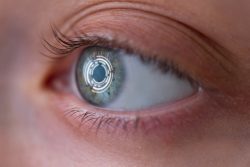 Fascinating research led by Buck Institute professor Pankaj Kapahi suggests that our eyes hold the key to understanding the aging process. By examining the blood vessel-rich tissue in the retina, known as the fundus, imaging technology can track human aging more accurately than other methods. This noninvasive and less expensive approach has even led to the development of a clock called eyeAge, which can pinpoint the genetic basis for aging.
Fascinating research led by Buck Institute professor Pankaj Kapahi suggests that our eyes hold the key to understanding the aging process. By examining the blood vessel-rich tissue in the retina, known as the fundus, imaging technology can track human aging more accurately than other methods. This noninvasive and less expensive approach has even led to the development of a clock called eyeAge, which can pinpoint the genetic basis for aging.
Researchers have found that retinal scans may hold the key to tracking the trajectory of aging. By noting changes in the eyes of those being treated, researchers believe they can determine the efficacy of these treatments with up to 71% accuracy in less than a year. Unlike traditional biomarkers that can fluctuate wildly based on common day-to-day factors, retinal scans are incredibly reliable and consistent.
The evidence suggests that changes in the microscopic blood vessels in the retina can be an early indicator of many age-related diseases, including Alzheimer’s, Parkinson’s, and even high blood pressure. Ophthalmologists can use these tiny capillaries to detect everything from tumors to AIDS, making your annual eye exam more important than ever.
Small changes in blood vessels can have big consequences, especially for those with diabetes. But detecting these changes can be a challenge even for advanced instruments. That’s why Google Research is leading the charge to use deep learning to predict and detect eye diseases. From diabetic retinopathy to glaucoma and AMD, these models can identify at least 39 eye diseases as well as non-eye diseases like chronic kidney and cardiovascular disease. And with the help of a well-studied dataset and over 100,000 patients, Google researchers have developed eyeAge, a tool that can predict a patient’s age based on their eye images alone. Thanks to advancements like these, we’re one step closer to a world where early detection is the norm, and preventative care is the rule, not the exception.
By monitoring individuals over multiple scans and time periods, the study found that predictions for aging were more precise and reliable when based on individual data, rather than randomly matched individuals. This means that by tracking changes in our eyes over time, we can gain valuable insight into our overall health and aging process. The results show that the age of our eyes is completely independent from our phenotypic age – giving us a whole new way to look at the aging process.
By utilizing retinal scans, we may be able to unlock a new understanding of the aging process and how to slow it down. In short, the results from the research are just the tip of the iceberg. There are so many exciting avenues to explore, questions to answer, and treatments to discover.
To view the original scientific study click below:
Longitudinal fundus imaging and its genome-wide association analysis provide evidence for a human retinal aging clock





